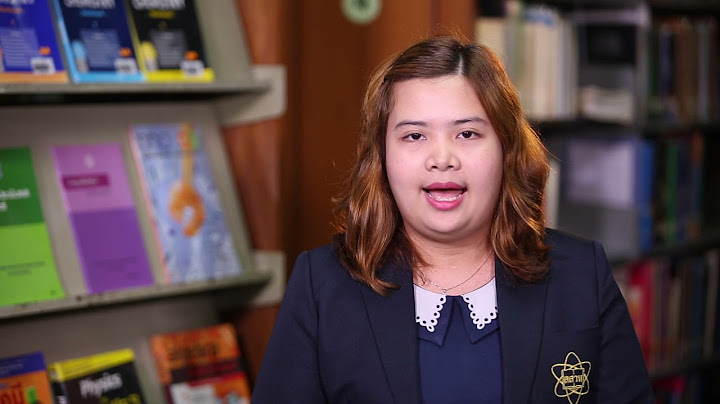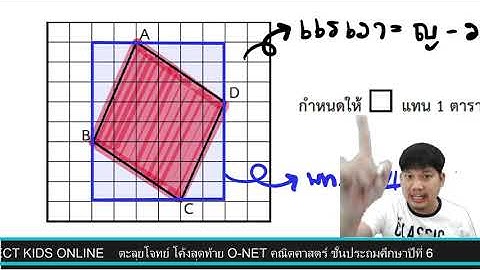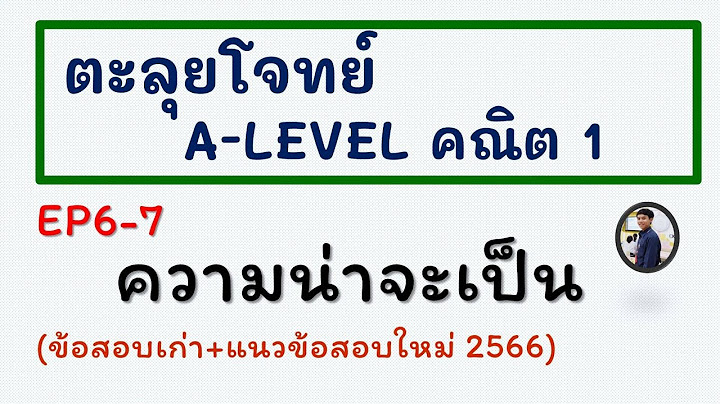ข้อสอบ Error Identification เป็นข้อสอบที่วัดทักษะด้านไวยากรณ์ของผู้สอบ โดยให้เราสังเกตว่าส่วนใดของประโยคมีการใช้ หลักไวยากรณ์ไม่ถูกต้อง Show วัด skill : ความรู้เรื่อง grammar และด้านโครงสร้างประโยค (sentence structure) Trick! grammar 5 เรื่องที่ออกบ่อยครอบคลุม 70% ของข้อสอบ! ⚫Part of Speech ⚫Connectors ⚫Subject-Verb Agreement ⚫Tenses ⚫Present/Past Participles - Present (V.ing) Past (V.3) (A) Adverbs of indefinite frequency may appear before the main verb. Choices (B), (C), and (D) are not possible positions for indefinite frequency adverbs. 2. Success depends _____ the efforts of the organization. (A) from (B) in (C) on (D) of Answer(C) on (C) Depend on is a two-word verb. Choices (A), (B), and (D) do not follow depend. 3. There has been strong competition; ________ the new company has made great profits. (A) instead (B) nonetheless (C) then (D) despite Answer(B) nonetheless (B) Nonetheless is a conjunction that indicates an unexpected result. Choice (A) indicates a substitution. Choice (C) indicates sequence. Choice (D) indicates an unexpected result but must be followed by a noun phrase. 4. Ms. Shirish will resign her position as chief ________ officer. (A) operator (B) operational (C) operation (D) operating Answer(D) operating (D) Operating forms part of the title chief operating officer. Choice (A) is a noun referring to people. Choice (B) is an adjective but is not used in this title. Choice (C) is a noun that refers to things. 5. The weather report predicts it will rain _______ become colder. (A) neither (B) nor (C) and (D) either Answer(C) and (C) And is a coordinating conjunction that links items equally. Choice (A) eliminates both items. Choice (B) is usually paired with neither. Choice (D) indicates a choice between items. 6. The printer _______ paper. (A) ran into (B) ran out of (C) ran without (D) ran over Answer(B) ran out of (B) To run out of something means to not have any more. Choice (A) means to meet unexpectedly. Choice (C) is confused with run out of. Choice (D) means to go beyond a limit. 7. The electricity went out _______ we were making coffee. (A) so (B) because of (C) while (D) for Answer(C) while (C) While is a subordinate conjunction that indicates simultaneous action. Choices (A) and (B) indicate cause and effect. Choice (D) indicates purpose. 8. _______ all the negotiators, Ms. Neos seems the most reliable. (A) From (B) As (C) Of (D) But Answer(C) Of (C) Of all indicates that one item is being singled out from a group. Choice (A) indicates direction away. Choice (B) indicates similarity. Choice (D) indicates an exception. 9. The sales division reported a 64 percent drop _______ the last sales period. (A) during (B) with (C) at (D) to Answer(A) during (A) During is a preposition that indicates a period of time. Choice (B) indicates association. Choice (C) indicates location. Choice (D) indicates direction toward. 10. The company is financially sound; _______, there is no debt. (A) in spite of (B) for example (C) on the other hand (D) nevertheless Answer(B) for example (B) For example indicates that one item is an instance of another. Choices (A) and (D) indicate unexpected results. Choice (C) indicates alternative points. TOEIC Reading (PRACTICE TEST 5 #ชุดที่ 2) ข้อ 11 – 2011. Get the invoice _______ upon receipt. (A) signature (B) sign (C) signed (D) signing Answer(C) signed (C) Someone else will sign the invoice, so the past participle is used. Choice (A) is a noun referring to a name that has been signed. Choices (B) and (D) are incorrect forms of the verb. 12. _______ time to submit a bid. (A) Still there is (B) Is there still (C) There is still (D) They’re still is Answer(C) There is still (C) Adverbs of indefinite frequency may appear after forms of the verb be. Choices (A), (B), and (D) are not possible positions for indefinite frequency adverbs 13. Our future will be _______ on what services we can provide. (A) basic (B) based (C) basing (D) base Answer(B) based (B) The past participle based completes the verb will be based on. Choice (A) is an adjective. Choice (C) is a gerund. Choice (D) is the present tense 14. If there _______ better communication, I would not resign. (A) were (B) was (C) is (D) will be Answer(A) were (A) Were is the form of be used in the ifclause of unreal conditions. Choices (B), (C), and (D) are not the form of be used in unreal conditions. 15. _______ the critics and answer their questions. (A) Stand in for (B) Stand at (C) Stand with (D) Stand up to Answer(D) Stand up to (D) To stand up to means to support a point of view against others. Choice (A) means to substitute. Choice (B) indicates position or attitude. Choice (C) means to associate with others for a cause. 16. By the end of this century, business _______ greatly. (A) will be changed (B) will have changed (C) changes (D) changed Answer(B) will have changed (B) Future perfect tense indicates a future action that will occur before another future action. Choice (A) is the passive form of the future. Choice (C) is the present tense. Choice (D) is the past tense. 17. The _______ market has declined in many parts of the country. (A) homing (B) housed (C) homes (D) housing Answer(D) housing (D) Housing market is a business term. Choice (A) refers to a certain kind of pigeon. Choice (B) is a past participle. Choice (C) is a noun referring to a thing. 18. _______ saving money, you will purchase a reliable product. (A) With (B) So (C) Besides (D) Consequently Answer(C) Besides (C) Besides indicates an additional supporting point. Choice (A) indicates association. Choice (B) indicates cause and effect. Choice (D) indicates result. 19. _______ one partner has resigned, others are quitting too. (A) Because (B) Although (C) If (D) Before Answer(A) Because (A) Because indicates cause and effect. Choice (B) indicates an unexpected result. Choice (C) is a conditional. Choice (D) indicates time sequence. 20. The management makes an assessment _______. (A) rarely (B) still (C) monthly (D) already Answer(C) monthly (C) Adverbs of definite frequency may appear at the end of a clause. Choices (A), (B), and (D) are adverbs of indefinite frequency. TOEIC Reading (PRACTICE TEST 5 #ชุดที่ 2) ข้อ 21 – 3021. The chairman said his _______ would continue his strategies. (A) successful (B) successor (C) success (D) successive Answer(B) successor (B) Successor means a person who follows another in a job or role. Choice (A) is an adjective. Choice (C) is a noun referring to a thing. Choice (D) is an adjective indicating sequence. 22. This region _______ as the costliest place to do business. (A) often is referred (B) is often referred (C) is referred often to (D) is often referred to Answer(D) is often referred to (D) Adverbs of indefinite frequency can appear between the auxiliary and the main verb. Choices (A), (B), and (C) are not appropriate positions for indefinite frequency adverbs. 23. Since 1990, our customers _______ with our service. (A) are satisfied (B) have satisfied (C) have been satisfying (D) have been satisfied Answer(D) have been satisfied (D) Have been satisfied is the passive form of the present perfect tense, which indicates an action that started in the past and continues to the present. Choice (A) is the present tense. Choice (B) is the present perfeci (active form). Choice (C) is the present perfect continuous. 24. People either don’t have the money _______ they aren’t willing to spend it. (A) and (B) neither (C) or (D) although Answer(C) or (C) Either . . . or is a paired conjunction. Choices (A), (B), and (V) are not paired with either. 25. The group is composed _______ five companies. (A) in (B) of (C) up (D) from Answer(B) of (B) Composed of is a two-word verb that indicates composition. Choices (A), (C), and (D) do not complete the verb. 26. In order to make more money, Mr. Garcia has decided to _______ a second job. (A) take off (B) take out (C) take from (D) take on Answer(D) take on (D) Take on means to accept a challenge. Choice (A) means to leave. Choice (B) means to remove. Choice (C) means to remove from someone’s possession. 27. A survey of the _______ shows they are satisfied with their jobs. (A) employment (B) employs (C) employees (D) employing Answer(C) employees (C) Employees is a noun that refers to the people who work for a business. Choice (A) is a noun that refers to a thing. Choices (B) and (D) are verbs. 28. _______ the bad location, the management is confident of success. (A) Despite (B) Since (C) With (D) As Answer(A) Despite (A) Despite indicates an unexpected result. Choice (B) indicates cause and effect. Choice (C) indicates association. Choice (D) indicates similarity. 29. Company officials must disclose their own _______ affairs. (A) finance (B) financing (C) financial (D) financed Answer(C) financial (C) Financial is an adjective that modifies affairs. Choice (A) is a verb. Choice (B) is a gerund. Choice (D) is a past participle. 30. The new business has _______ incorporated. (A) still (B) once (C) yet (D) already Answer(D) already (D) Already is an adverb of indefinite frequency indicating a completed action and may appear between the auxiliary and the main verb. Choice (A) indicates an ongoing situation. Choice (B) is an adverb of definite frequency. Choice (C) indicates an action that has not taken place at the time indicated. TOEIC Reading (PRACTICE TEST 5 #ชุดที่ 2) ข้อ 31 – 4031. The manufacturer listed assets _______ liabilities. (A) but (B) nor (C) and (D) so Answer(C) and (C) And is a conjunction that links items equally. Choice (A) indicates a contrast between items. Choice (B) is usually paired with neither. Choice (D) indicates cause and effect. 32. The competitor’s attempt to _______ the new company was stopped. (A) take off (B) take over (C) take to (D) take out Answer(B) take over (B) Take over means to obtain control of. Choice (A) means to leave. Choice (C) means to bring something to a person or place. Choice (D) means to remove. 33. The new agent has experience _______ not expertise. (A) but (B) and (C) with (D) however Answer(A) but (A) But is a conjunction that indicates a contrast between items. Choice (B) links items equally. Choice (C) indicates association. Choice (D) indicates 34. _______ the flight is cancelled, the seminar will have to be postponed. (A) While (B) If (C) Although (D) Besides Answer(B) If (B) If can indicate a possible situation. Choice (A) indicates simultaneous action. Choice (C) indicates an unexpected result. Choice (D) adds an idea. 35. The proposal was submitted _______ April 28. (A) at (B) the (C) on (D) from Answer(C) on (C) On is used with specific dates. Choice (A) indicates time or location. Choice (B) is an article. Choice (D) is used with dates only to indicate a limit on a time span: from April 28 to May 1. 36. _______ costs have increased dramatically. (A) Advertising (B) Advertisements (C) Advertised (D) Advertise Answer(A) Advertising (A) Advertising costs describes the cost of providing advertisements. Choice (B) is a noun referring to things. Choice (C) refers to costs that have been advertised. Choice (D) is a verb. 37. Ford Motor Company reported a drop _______ quarterly profits. (A) to (B) from (C) in (D) with Answer(C) in (C) A drop in (quarterly) profits is a business expression. Choice (A) might be used to indicate the level of the drop. Choice (B) might be used to indicate the starting point of the drop: dropped from two million to one million. Choice (D) indicates association. 38. The company was _______ by an immigrant. (A) found (B) founding (C) find (D) founded Answer(D) founded (D) Founded means established or started.Choice (A) found means located. Choice (B) is an adjective. Choice (C) is the simple form of the verb find. 39. Mr. Daley is our most skilled speaker; _______, he is unavailable to give the presentation. (A) besides (B) nevertheless (C) for example (D) while Answer(B) nevertheless (B) Nevertheless indicates an unexpected result. Choice (A) adds additional information. Choice (C) indicates an example. Choice (D) indicates simultaneous action. 40. Have Ms. Alva _______ a press release immediately. (A) writes (B) to write (C) writing (D) write Answer(D) write (D) Ms. Alva will write the press release so the simple form write is used. Choice (A) is the present tense. Choice (B) is the infinitive. Choice (C) is the present participle. ลองทำข้อสอบ TOEIC Reading ของเรา ผลเป็นอย่างไรบ้างคะ ข้อสอบ 40 ข้อได้คะแนนเท่าไหร่กันบ้าง? มนบทความหน้า เอ็ด ดู เฟิร์สท์ จะหาแนวข้อสอบ TOEIC มาให้เพื่อนๆ ได้ลองฝึกทำกันอีก อย่าลืมแชร์ข้อสอบโทอิค ไปให้เพื่อนๆ ฝึกทำกันด้วยน๊า ถ้าชอบบทความของเรา โหวตคะแนน 5 ดาวด้านล่างเพื่อเป็นกำลังใจให้ด้วยจ้า  อยากได้คะแนน TOEIC สูงๆเรียน TOEIC ที่ไหน ดี?“อยากได้คะแนน TOEIC สูงๆ เรียน TOEIC @ EduFirst เพื่อเตรียมพร้อมก่อนสอบจริง!” การเรียนภาษาอังกฤษเตรียมสอบ กับ เอ็ด ดู เฟิร์สท์ จะช่วยให้คุณไปสอบ TOEIC ด้วยความมั่นใจเต็มร้อย คอร์สเรียน TOEIC ของสถาบัน “เอ็ด ดู เฟิร์สท์” สอนโดยครูผู้เชี่ยวชาญ การติวสอบ TOEIC โดยเฉพาะ ที่พร้อมจะสอนเทคนิคการทำข้อสอบในทุกพาร์ทให้กับคุณ เพื่อคะแนน TOEIC สูงตามคาดหวัง เรียน TOEIC สด 100 % เลือกรูปแบบการเรียนได้ เข้าเรียนที่โรงเรียน / เรียนออนไลน์, แบบกลุ่มเล็ก /ตัวต่อตัว พร้อมรับรองผล |

กระทู้ที่เกี่ยวข้อง
การโฆษณา
ข่าวล่าสุด
ผู้มีส่วนร่วม
การโฆษณา
ผู้มีอำนาจ
การโฆษณา
ถูกกฎหมาย
ช่วย

ลิขสิทธิ์ © 2024 th.apacode Inc.




























